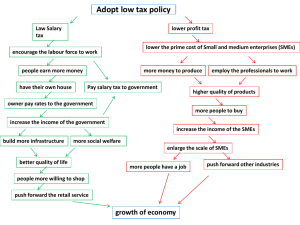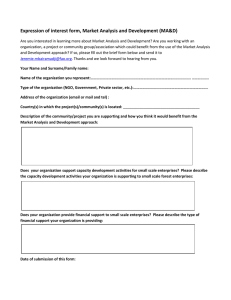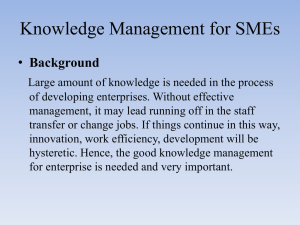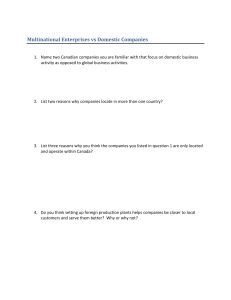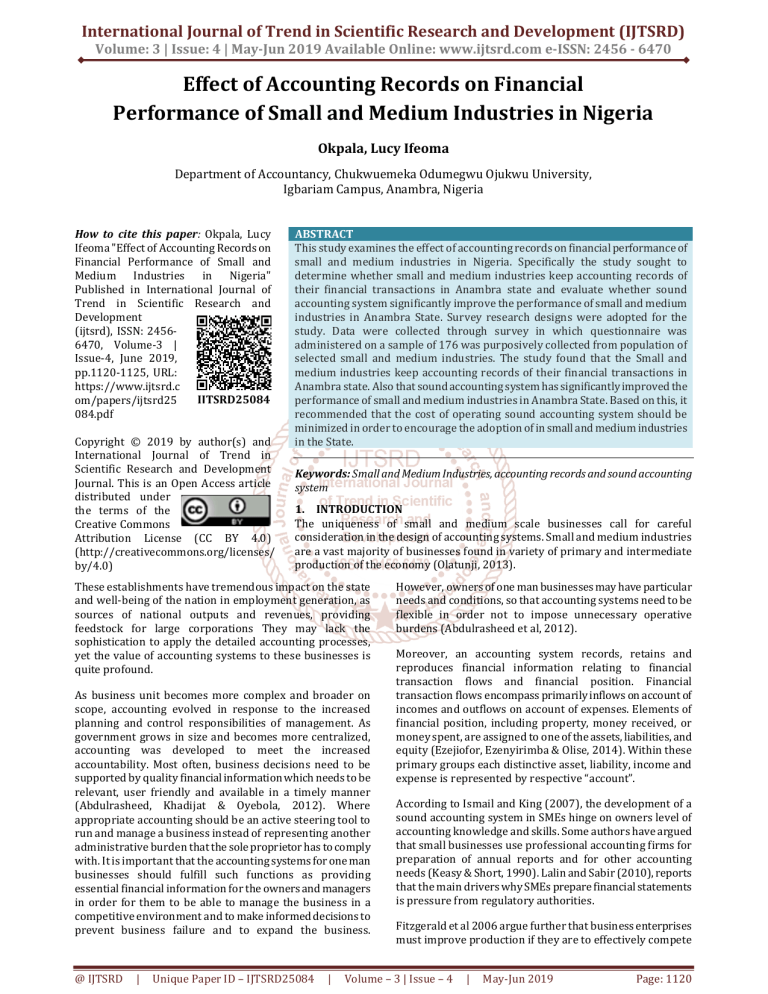
International Journal of Trend in Scientific Research and Development (IJTSRD)
Volume: 3 | Issue: 4 | May-Jun 2019 Available Online: www.ijtsrd.com e-ISSN: 2456 - 6470
Effect of Accounting Records on Financial
Performance of Small and Medium Industries in Nigeria
Okpala, Lucy Ifeoma
Department of Accountancy, Chukwuemeka Odumegwu Ojukwu University,
Igbariam Campus, Anambra, Nigeria
How to cite this paper: Okpala, Lucy
Ifeoma "Effect of Accounting Records on
Financial Performance of Small and
Medium Industries in Nigeria"
Published in International Journal of
Trend in Scientific Research and
Development
(ijtsrd), ISSN: 24566470, Volume-3 |
Issue-4, June 2019,
pp.1120-1125, URL:
https://www.ijtsrd.c
IJTSRD25084
om/papers/ijtsrd25
084.pdf
Copyright © 2019 by author(s) and
International Journal of Trend in
Scientific Research and Development
Journal. This is an Open Access article
distributed under
the terms of the
Creative Commons
Attribution License (CC BY 4.0)
(http://creativecommons.org/licenses/
by/4.0)
ABSTRACT
This study examines the effect of accounting records on financial performance of
small and medium industries in Nigeria. Specifically the study sought to
determine whether small and medium industries keep accounting records of
their financial transactions in Anambra state and evaluate whether sound
accounting system significantly improve the performance of small and medium
industries in Anambra State. Survey research designs were adopted for the
study. Data were collected through survey in which questionnaire was
administered on a sample of 176 was purposively collected from population of
selected small and medium industries. The study found that the Small and
medium industries keep accounting records of their financial transactions in
Anambra state. Also that sound accounting system has significantly improved the
performance of small and medium industries in Anambra State. Based on this, it
recommended that the cost of operating sound accounting system should be
minimized in order to encourage the adoption of in small and medium industries
in the State.
Keywords: Small and Medium Industries, accounting records and sound accounting
system
1. INTRODUCTION
The uniqueness of small and medium scale businesses call for careful
consideration in the design of accounting systems. Small and medium industries
are a vast majority of businesses found in variety of primary and intermediate
production of the economy (Olatunji, 2013).
These establishments have tremendous impact on the state
and well-being of the nation in employment generation, as
sources of national outputs and revenues, providing
feedstock for large corporations They may lack the
sophistication to apply the detailed accounting processes,
yet the value of accounting systems to these businesses is
quite profound.
As business unit becomes more complex and broader on
scope, accounting evolved in response to the increased
planning and control responsibilities of management. As
government grows in size and becomes more centralized,
accounting was developed to meet the increased
accountability. Most often, business decisions need to be
supported by quality financial information which needs to be
relevant, user friendly and available in a timely manner
(Abdulrasheed, Khadijat & Oyebola, 2012). Where
appropriate accounting should be an active steering tool to
run and manage a business instead of representing another
administrative burden that the sole proprietor has to comply
with. It is important that the accounting systems for one man
businesses should fulfill such functions as providing
essential financial information for the owners and managers
in order for them to be able to manage the business in a
competitive environment and to make informed decisions to
prevent business failure and to expand the business.
@ IJTSRD
|
Unique Paper ID – IJTSRD25084
|
However, owners of one man businesses may have particular
needs and conditions, so that accounting systems need to be
flexible in order not to impose unnecessary operative
burdens (Abdulrasheed et al, 2012).
Moreover, an accounting system records, retains and
reproduces financial information relating to financial
transaction flows and financial position. Financial
transaction flows encompass primarily inflows on account of
incomes and outflows on account of expenses. Elements of
financial position, including property, money received, or
money spent, are assigned to one of the assets, liabilities, and
equity (Ezejiofor, Ezenyirimba & Olise, 2014). Within these
primary groups each distinctive asset, liability, income and
expense is represented by respective “account”.
According to Ismail and King (2007), the development of a
sound accounting system in SMEs hinge on owners level of
accounting knowledge and skills. Some authors have argued
that small businesses use professional accounting firms for
preparation of annual reports and for other accounting
needs (Keasy & Short, 1990). Lalin and Sabir (2010), reports
that the main drivers why SMEs prepare financial statements
is pressure from regulatory authorities.
Fitzgerald et al 2006 argue further that business enterprises
must improve production if they are to effectively compete
Volume – 3 | Issue – 4
|
May-Jun 2019
Page: 1120
International Journal of Trend in Scientific Research and Development (IJTSRD) @ www.ijtsrd.com eISSN: 2456-6470
in this era of rapid economic and technical change. Improved
productivity requires both capital investment as well as a
work force that has the flexibility to acquire new skills for
newly created jobs resulting from structural changes in the
economy. Bititei et al (2001) asserts that performance is a
result of workers because they provide the strongest linkage
to strategic goals of the business enterprise, Customer
satisfaction and economic contribution that affects the
business, hence it addresses the mode in which an activity is
accomplished in particular and the level of standards to
which a task is carried out within the working environment.
Meanwhile, most of the studies such like Harash (2014),
found that accounting information such as: reliability,
relevance, timeliness, and accessible have significant effects
on SMEs' performance. Olatunji (2013) results showed that
adoption of sound accounting system enhances performance
of small and medium scale businesses. Mwebesa, Kansiime,
Asiimwe, Mugambe and Rwego (2018) also found positive
relationship between accounting records and performance
of small and medium enterprises. Among these studies, none
had been carried out in Anambra State. According to
Ikechukwu (1993), keeping records is crucial for the
successful performance of a business. A comprehensive
record keeping system makes it possible for entrepreneurs
to develop accurate and timely financial reports that show
the progress and current condition of the business. With the
financial report generated from a good recordkeeping
system, performance during one period of time (month,
quarter or year) with another period can be compared.
Based on the above development, this study therefore
determines the effect of financial records on financial
performance of small and medium industries in Anambra
State, Nigeria. Specifically to:
1. Determine whether small and medium industries keep
accounting records of their financial transactions in
Anambra state.
2. Evaluate whether sound accounting system significantly
improve the performance of small and medium
industries in Anambra State.
Review of related Literature
Financial Records
According to Ademola, Olukotun, Samuel and Ifedolapou
(2012), financial record keeping is the foundation on which
modern businesses thrive for growth and sustainability.
Meanwhile, businesses are highly depends on financial
records kept in the books of accounts showing different
transactions such as sales, purchases, income, and payments
by an individual or organizations (Dawuda & Azeko, 2015).
For several groups to perform coherently, efficiently,
effectively and ensure profitability, they must keep financial
records (Ozotambgo, 2015; Trived & Shilpa, 2010). Good
financial records, however, can greatly improve many of the
management decisions a business owner and or manager
takes, including decisions about marketing, personnel,
borrowing, pricing, inventory, and product development
(Muchira, 2012). Such financial records include; income
statement, statement of financial position (balance sheet),
the statement of Cash flows, and the financial internal
control system records that check the accuracy of company
transactions (Ssekajugo etal., 2013).
It is believed that record keeping has a significant impact on
financial performance of a given business. For example,
@ IJTSRD
|
Unique Paper ID – IJTSRD25084
|
Onaolapo (2014) asserts that record keeping gives
substantial information about the financial strength and
current performance of an enterprise and therefore
managers find those records useful in making decisions.
Maseko and Manyani (2011) and Amoako (2013) both
affirmed that financial record keeping and financial
transparency are inseparable. Complementarily, Muchira
(2013) agreed that good record keeping will make any
business partner or investor more aware of what is going on
in their businesses and it will save them money.
An account is simply a record of financial inflows and
outflows in relation to the respective asset, liability, income
or expense. Income and expense accounts are considered
temporary accounts, since they represent only the inflows
and outflows absorbed in the financial-position elements on
completion of the time period (Williams, Haka, Bettner, &
Carcello, 2008).
In most industries, comparability will be affected by size.
Larger firms will be able to avail themselves economic and
certain sophisticated quantitative management techniques
that may not be practicable for small ones. Smaller
companies may be able to maintain closer client relation and
better customer relation than the larger ones. This difference
in operation technique may influence deficit in accounting
method employed in generating financial information
(Abdulrasheed, Khadijat & Oyebola, 2012).
Small and Medium Scale Businesses
The small businesses may not even have kept any records at
all but for tax purposes. It should be remembered that
accounting is aid to management and not an end in itself. It is
therefore only fair to expect that the small and medium scale
businesses would not incur costs above justified limits
(Iopev and Kwanum, 2012; Bamiduro, 2003). Niswonger and
Fess (1969) insists “each system must be designed to fit the
nature of the individual enterprise, the volume of
transactions of various types, and the number and the
capacities of the personnel. Internal control in small and
medium scale enterprises may not be as detailed as those of
large companies but it should comprehensively cater to the
needs of the enterprises and users of its reports such that it
provides reasonable assurance of truth and fairness (Mbroh,
2013).
According to Wood (1979), most of small businesses have all
the information they want by merely keeping a cashbook
and having some form of records, not necessarily in double
entry system (Olaoye, 2012). This is an aberration and
requires a conversion to double entry system for meaningful
reporting (Onaolapo, et al. 2011). The mechanics of the
conversion involve the preparation of a statement of affairs
and estimation certain data for the updates of full set of
ledgers and henceforth a complete double entry system is
installed (Pickles & Lafferty, 1974).
According to Ademola et al (2012),Small scale enterprises
are catalysts for catalysts for world’s economic growth and
development which have dominated the industrial sector of
both developed and underdeveloped countries. Aruwa
(2006) believed that Nigeria’s industrial sector is dominated
by small and medium scale enterprises (SMEs) which
accounts for 90% in terms of number of enterprises, as
compared with other developed countries where more than
98% of all their enterprises belong to SME sector, about 80%
of the total industrial labour force in Japan is SME, 50% in
Volume – 3 | Issue – 4
|
May-Jun 2019
Page: 1121
International Journal of Trend in Scientific Research and Development (IJTSRD) @ www.ijtsrd.com eISSN: 2456-6470
Germany, 46% in USA are employed in smaller firms. Central
Bank of Nigeria defined small scale enterprises as all
businesses with a total assets investment of less than one
million, an annual turnover of less than one million and with
a total number of employees of less than fifty (World Bank
Mapping 2001). In addition, the International Finance
Corporation (IFC) and Corporate Affairs Commission in 2001
further justified that Nigeria’s industrial sector is dominated
by SMEs, estimated to be about 90% of the sector employing
less than 50% of the people (HPACI 2002). Given the place
occupied by the SMEs in Nigeria’s industrial sector, it is
expected that the success of the Nigerian economy would be
partly dependent on the success of the SMEs. Nwoye (1991)
pointed out clearly that SMEs are catalysts for Nigeria’s
economic growth and development. He believe that through
so many SMEs, Nigeria has great potentials for success and
growth, sales of large volume of goods etc. Even though,
some of them have adequate capital, many of them fail due to
poor financial management operations (Ezejofor et al, 2014).
Controls may have to depend on the close involvement of the
owners in the management of the business and to extent of
their integrity. This calls for an adaptation of accounting
systems to need of these businesses (Abeygunasekera &
Fonseka, 2013). According to Morries (2007) Small
businesses have some inherent disadvantageous
characteristics that will require that they be provided with
public supports. Such characteristics, apart from limited
managerial capabilities, include lack of economies of scale,
lack of collective voice and influence on policy, frequent
cases of market failures and/or biases against small
businesses, weak financial capacity to undertake R$D or the
costly support services such as Business Development
Service (BDS), and huge knowledge gaps (most small
business promoters don’t know what they need to know but
which they don’t know). When these public supports are not
available, chances of failure can be very strong.
Empirical Review
Quite number of studies had been carried out on accounting
records and performance of small and medium enterprises
in Nigeria and beyond. The relationship between accounting
Information systems and SMEs performance was conducted
by Harash (2014), who tested the influence of characteristics
enjoyed by the accounting information in determining SMEs'
performance. It was found that the characteristics enjoyed
by the accounting information such as: reliability, relevance,
timeliness, and accessible have significant effects on the use
of AIS and SMEs' performance.
According to Oladejo (2008), the achievement of the firm’s
objectives is greatly influenced by the application of
accounting records. Most businesses in Nigeria still are not
aware of the importance and benefits of accounting records.
It is found that accounting records are faced with some
challenges which are inadequate infrastructural facilities,
inability of most business firms to demand accounting
systems adequate to them for their needs, lack of
standardized professional body in accounting records and
also local firms are been threatened by developed countries
that are enjoying the full benefits of accounting records. He
concluded that accounting records has contributed
immensely to the unprecedented rate in the growth of small
businesses in identifying the expenses, income, and profit
and loss of a firm at the end of an accounting year.
@ IJTSRD
|
Unique Paper ID – IJTSRD25084
|
Okoli (2011) links proper record keeping and profitability of
small scale enterprises. In a study of 148 respondents in
Nigeria (Enugu), and assert that due to inadequate record
keeping, the small scale operators could not assess their
performances effectively. He argues that in order to enhance
the profitability of small scale enterprises and their
continuity, there is need for adequate record keeping which
will help the proprietors to keep track of the performance of
these enterprises. Mensah et al. (2007) states that a
significant number of enterprises in their survey kept no
records pertaining to operations, finance, audited accounts,
tax returns, and so on. Until recently, all the micro and small
enterprise could not receive credit from the banks and
promotional institutions on grounds that the formal banking
sector considered them a high risk area, and hence charged
them high cost for borrowed funds from the banks. Ezejiofor,
Ezenyirimba and Olise (2014) determined the contributions
of accounting records in efficient performance of small scale
business. Two hypotheses were formulated in line with the
objectives of the study. Survey method was adopted and data
were collected through the use of questionnaire. Data
generated were analyzed with means, standard deviation
and weighted value and the hypotheses formulated were
tested using Z-test statistical technique. The study found The
training of accountants by these institution and the various
professional institutes should focus more on practical means
of solving accounts reporting needs of small and medium
scale enterprises; and that government should provide
adequate financial assistance, this is because if there is
adequate financial support, more unemployed Nigerians will
engage in small scale enterprises thereby gain their means of
living easily than looking for unavailable while collar job.
Olatunji (2013) examined the impact of sound accounting
system on corporate performance of small and medium scale
enterprises. This was done by a survey carried out through
questionnaire and analyzed using the F-Statistic (ANOVA).
Results showed that adoption of sound accounting system
enhances performance of small and medium scale
businesses. Mwebesa, Kansiime, Asiimwe, Mugambe and
Rwego (2018) carried out study in three rural districts of
Rubirizi, Kasese and Rukungiri in Western Uganda with the
aim of determining the effects of financial record keeping on
financial performance of Development groups. A total of 99
respondents were obtained from 33 development groups.
Data were entered in Epi data 3.1 and descriptive and
correlational analyses were done using SPSS version 21.
Using the Likert scale with five categories from strongly
agree to strongly disagree, a mean value of 3.5 indicated a
strong agreement to the questions asked. Findings revealed
a significant positive relationship between the financial
record keeping and financial performance.
Emad (2017) described the effects of accounting information
system (AIS) on the accounting performance of Small and
medium enterprises (SMEs). The results show a positive
relationship between the AIS and accounting performance in
Iraqi SMEs.
Methodology
The population for the study consists of small and medium
industries in Anambra State. The researchers used
judgmental sampling technique to select one hundred and
seventy six representatives to other small and medium
industries in Anambra State.
Volume – 3 | Issue – 4
|
May-Jun 2019
Page: 1122
International Journal of Trend in Scientific Research and Development (IJTSRD) @ www.ijtsrd.com eISSN: 2456-6470
Method of Data Analysis
The questionnaires were analysed and hypotheses
formulated for the study were tested with the Univariate
Analysis of Variance (UAV) for opinion differences, using the
Statistical Package for Social Sciences (SPSS) version 20.0
software package.
Software Description
Statistical Package for Social Sciences (SPSS) is a software
solution utilized in data analysis after carefully inputting the
variables used in the study.
Decision Rule:
Using SPSS, 5% is considered a normal significance level. The
accept reject criterion was based on the computed F-Value.
DATA PRESENTATION, ANALYSIS AND INTERPRETATION
Analysis of Data
Table 1: showing mean ratings on accounting records on small and medium industries in Anambra State.
S/N
Women has influence on
Mean Decision
1
SMIs always keeps records of their transactions
3.98
Accept
2
A times SMIs seek the service of an expert
3.56
Accept
3
SMIs uses accounting records to monitor the strength and weakness of their transactions 3.34
Accept
4
Accounting records is being kept in SMIs
3.13
Accept
5
Accounting professionals usually provide professional advice to SMIs
2.39
Reject
6
Sound accounting helps SMIs in debt management
2.15
Reject
7
There is a records for financial asset of SMIs
2.36
Reject
8
Sound accounting record has influence on SMIs income
3.67
Accept
9
Sound accounting system gives insight on the cash flow
2.86
Reject
10 Sound accounting system helps SMIs in their tax assessment
2.67
Reject
Average Mean Ratings
3.01
Accept
Source: Field Survey, (2019)
Findings on table 5 above shows that, items 1 – 4, 8 with mean ratings of 3.98, 3.56, 3.34, 3.13, and 3.367 are accepted as
household decision women are involved during decision making in homes, while item 5-7, 9 and 10 are rejected considering
the mean ratings of 2.39, 2.15, 2.36, 2.86, and 2.67 as decisions women do not contribution when household decisions are being
taken.
Test of Hypotheses
Table 2: Univariate Analysis of Variances
Tests of Between-Subjects Effects
Source
Type III Sum of Squares Df Mean Square
Corrected Model
759.675a
213
3.567
Intercept
581.093
1
581.093
HYPOTHESIS1
14.237
11
1.294
HYPOTHESIS11
6.964
13
1.536
HYPOTHESIS1 *
Error
Total
Corrected Total
a.
45.818
23
1.066
65.083
32
.904
4135.000
176
824.759
175
R Squared = .921 (Adjusted R Squared = .688)
Hypothesis One
H01: Small and medium industries do not keep accounting
records of their financial transactions in Anambra state.
In table 2 above, (F value =1.43 and Sig value =0 .18) thus,
indicating that there is a significant difference and alternate
hypothesis is accepted while null hypothesis is rejected.
Therefore, the Small and medium industries keep accounting
records of their financial transactions in Anambra state.
Hypothesis Two
H02: Sound accounting system does not significantly
improve the performance of small and medium industries in
Anambra State.
@ IJTSRD
|
Unique Paper ID – IJTSRD25084
|
F
3.946
642.848
1.432
1.593
Sig.
.000
.000
.178
.852
1.179
.265
Decision: In table 2 above, the result obtained indicates that
there is a significant difference at ‘F’, value =1.593 and ‘Sig’,
value = .852) thus, alternative hypothesis is accepted while
null hypothesis is rejected. Therefore, sound accounting
system has significantly improved the performance of small
and medium industries in Anambra State.
Interaction Effect of the Hypotheses
Hypothesis 1 and Hypothesis 11
From table 2 above result indicates that hypothesis one
interacted with hypothesis two and there was a significant
interaction effect between the two hypotheses at point
[F=1.18], [Sig=0.23], therefore the adoption of the two
hypotheses: the small and medium industries keep
accounting records of their financial transactions in
Anambra state and the sound accounting system of small and
medium industries in Anambra State will simultaneously
influence the financial performance of small and medium
industries in Anambra State.
Volume – 3 | Issue – 4
|
May-Jun 2019
Page: 1123
International Journal of Trend in Scientific Research and Development (IJTSRD) @ www.ijtsrd.com eISSN: 2456-6470
Conclusion and Recommendations
Accounting records plays a vital role in the growth and
performance of SMIs to strive. However, the small and
medium industries keep accounting records of their financial
transactions and the sound accounting system of small and
medium industries in Anambra State will simultaneously
influence the financial performance of small and medium
industries in Anambra State. Accounting records may not
only influence high performance to the industries, it can flags
up some vital activities that can lead to higher goals of the
industries.
Efficiency of accounting records ensures that all levels of
management get true information, sufficient enough for
planning and increases the control and enhances the
accounting performance in small and medium industries.
Based on this, it recommended that the cost of operating
sound accounting system should be minimized in order to
encourage the adoption of in small and medium industries in
the State. More effort should be allocated to accounting
records for effective performance of small and medium
industries.
References
[1] Abdulrasheed A., Khadijat A., & Oyebola F. E,(2012)
Accounting Principles of Small Enterprises in Ilorin
Metropolis of Kwara State, Nigeria Research Journal of
Finance and Accounting www.iiste.org ISSN 2222-1697
(Paper) ISSN 2222-2847 (Online) 3(2).
[2] Ademola, G. O., James, S. O., & Olore, I. (2012). The roles
of record keeping in the survival and growth of small
scale enterprisesin Ijumu Local Government Area of
Kogi State. Global Journal of Management and Business
Research, 12(13).
[3] Aruwa, S. A. (2006). The Business Entrepreneur,
Academy Publication, Kaduna, Nigeria.
[4] Amoako, G. K. (2013).Accounting Practices of SMEs: A
Case Study of Kumasi Metropolis in Ghana.
International Journal of Business and Management,
8(24). http://dx.doi.org.10.5539/ijbm.v8n24p73
[5] Babarinde A. (2003) Financial Accounting, Volume 1,
Lagos: JBA Associates Ltd, p 313
[6] Bamiduro, J. A (2003). An Assessment of Small and
Medium Scale Industries Performance in Nigeria in
Babcock Journal of Management and Social
Sciences.1(2).
[7] Bititei, U.S., Suwignjo, P. & Came, A.S. (2001). Strategy
management through quantitative modeling of
performance measurement systems. International
Journal of production Economics 69, 15-22.
[8] Dawuda, A., & Azeko, I. (2015). An Assessment of
Financial Records Keeping Behaviour of Small Scale
Businesses in Ghana: ACase Study of Bolgatanga
Municipality. International Journal of Finance and
Accounting,
4(3),
187-194.
http://dx.doi.org.10.5923/j.ijfa.20150403.06.
[9] Emad, H. (2017). Accounting performance of SMEs and
effect of accounting information system: a conceptual
model. Global Journal of Management and Business
Research: D Accounting and Auditing. 17(3). Online
ISSN: 2249-4588 & Print ISSN: 0975-5853.
@ IJTSRD
|
Unique Paper ID – IJTSRD25084
|
[10] Ezejiofor, R. A, Ezenyirimba, E. & Olise, C. M. (2014).
The relevance of accounting records in small scale
business: The Nigerian experience. International
Journal of Academic Research in Business and Social
Sciences. 4(12). ISSN: 2222-6990.
[11] Fitzgerald, L., Johnson, R., Brignall, S., Silverstro, R &
Voss, C. (2006). Performance measurement in service
business. London (CIMA).
[12] Harash E., Alsaadi, J., & Al-Timimi, S. (2014). Financial
performance of SMEs – Evidence on the Influence of
Environmental Uncertainty: A Conceptual Framework.
Journal China-USA Business Review, 13, (8), 540-545.
[13] Ikechukwu C. (1993). Success Key Point Book Keeping
and Accounts. Onitsha: Hybrid Publisher Limited.
[14] Ismail, N. A., & King, M. (2007). Factors influencing the
alignment of accounting information in small and
medium sized Malaysian firms. Journal of Information
System and Small Business, 1(1–2), 1–20.
[15] Keasy, K., & Short, H. (1990). The accounting burdens
facing small firms: An empirical research note. Journal
of Accounting Business Research, 20(80), 307–313.
http://dx.doi.org/10.1080/00014788.1990.9728889
[16] Lalin, H., & Sabir, R. I. (2010). Research on Usage and
Usefulness Perception of Financial Accounting
Practices in Less Developing Countries: A case of
Cambodia. Proceedings of the Proceedings of the 7th
International Conference on Innovation &
Management, 1881–1885.
[17] Iopev, Luper and Kwanum, I.. M (2012) An Assessment
of Risk Management of Small and Medium Scale
Enterprises in Nigeria in Research Journal of Finance
and Accounting 3(5) www.iiste.org
[18] Mensah, J. V., Tribe, M., & Weiss, J. (2007). The smallscale manufacturing sector in Ghana: A source of
dynamism or of subsistence income? Journal of
International
Development,
19(2),
253–273.
http://dx.doi.org/10.1002/jid.1322
[19] Maseko, N.,& Manyani,O.(2011). Accounting practices
of SMEs in Zimbabwe: An investigative study of record
keeping for performance measurement. A case study of
Bindura. Journal of Accounting and Taxation 3(8), 158.
http://dx.doi.org.10.5897JAT11.031.
[20] Mbroh, (2013) Accounting and Control Systems
Practiced By Small and Micro Enterprise Owners
within the Cape Coast Metropolitan Area of Ghana in
Asian Journal of Business and Management
SciencesVol. 1 No. 9 [28-47]
[21] Muchira, B. W. (2012). Record Keeping and Growth of
Micro and Small Enterprises. A Case Study Municipally
in Kenya. Masters of Business Administration (thesis)
of Kenyatta University.
[22] Niswoger, C. R & Philip E. Fess, (1969) Accounting
Principles 10thEd. Cincinnati: South- Western
Publishing Company. p1, 267
[23] Nwoye, M. I. (1991); Small business enterprises (How
to start and succeed); Social Science Series Benin City
Nigeria.
[24] Okoli, B. E. (2011). Evaluation of the accounting
systems used by small scale enterprises in Nigeria: The
Case of Enugu-South East Nigeria, Asian. Journal of
Business Management, 3(4), 235-240.
Volume – 3 | Issue – 4
|
May-Jun 2019
Page: 1124
International Journal of Trend in Scientific Research and Development (IJTSRD) @ www.ijtsrd.com eISSN: 2456-6470
[25] Olatunji, T.E. (2013).The impact of accounting system
on the performance of small and medium scale
enterprises in Nigeria – A survey of SME’s In Oyo StateNigeria. International Journal of Business and
Management Invention ISSN (Online): 2319 – 8028,
ISSN (Print): 2319 – 801X www.ijbmi.org 2(9).
[26] Onaolapo, A. A. & Adegbite, T. A. (2014). The analysis of
the impact of accounting records keeping on the
performance of the small scale enterprises.
International Journal of Academic Research in Business
and Social Sciences. 4(1). ISSN: 2222-6990.
[27] Olaoye, C.O (2012) Fundamental of Financial
Accounting 2 Ado-Ekiti: Jehovah-Jireh Publishers
[28] Ozatambgo, O.(2015). Financial Record Keeping In
Religious Organizations: A Case Study of Catholic
Church in Enugu Diocese.Understanding the context of
@ IJTSRD
|
Unique Paper ID – IJTSRD25084
|
electronic records management. Training in Electronic
records management.
[29] Pickles, W. & Lafferty, J. L. (1974) Accountancy London:
ELBS and Pitman Publishing. p1101
[30] Ssekajugo, D., Tuyishime, E.,& Kasenene, E. S. (2013).
Performance of public institutions in Ngororero
District, North Western Rwanda.
[31] Trivedi, S. M. (2010). An analysis of financial
performance of state road Transport Corporation in
Gujarat. Doctoral dissertation, Saurashtra University.
[32] Williams, J. R., Haka, S. F., Bettner, M. S., & Carcello, J. V.
(2008). Financial and Managerial Accounting. New
York, NY: Mc Graw-Hill Irwin.
[33] Wood, F. (1979) Business Accounting 1 Third Ed.
Essex: ELBS and Longman, p 251
Volume – 3 | Issue – 4
|
May-Jun 2019
Page: 1125

